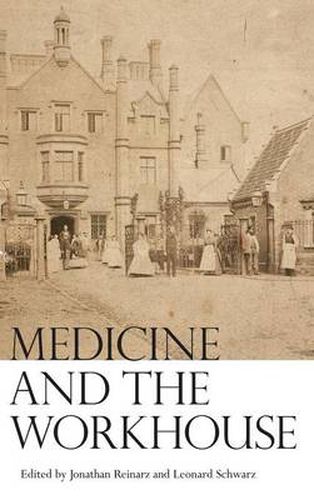Readings Newsletter
Become a Readings Member to make your shopping experience even easier.
Sign in or sign up for free!
You’re not far away from qualifying for FREE standard shipping within Australia
You’ve qualified for FREE standard shipping within Australia
The cart is loading…






Throughout the eighteenth and nineteenth centuries workhouses were a key provider of medical care to the poor. Workhouse beds in Britain far outnumbered beds provided by charitable hospitals, and a high percentage of inmates wereelderly and infirm, needing not only accommodation and work but also medical relief.
Historians of welfare, the English poor laws, and medicine have been aware of the importance of workhouse-based medicine, but the topic hasnot been studied in depth. This volume is the first to examine the history of the medical services provided by these institutions both in Britain and its former colonies, over the period covered by the Old and New Poor Laws. Written by prominent historians of medicine, welfare, and social policy, the essays document the experiences of those who received care or died in these houses, and form the critical foundation for a new historiography of workhouse medicine.
Contributors: Jeremy Boulton, Virginia Crossman, Romola Davenport, Steven King, Angela Negrine, Susannah Ottaway, Rita Pemberton, Jonathan Reinarz, Alistair Ritch, Leonard Schwarz, Samantha Shave, Kevin Siena, Leonard Smith, Alannah Tomkins.
Jonathan Reinarz is director of the History of Medicine Unit at the University of Birmingham, UK. He has published extensively on the history of English medical institutions, 1750-1950.
Leonard Schwarz has recently retired as a reader in Urban History at the University of Birmingham, where he founded the Birmingham Eighteenth Century Centre.
$9.00 standard shipping within Australia
FREE standard shipping within Australia for orders over $100.00
Express & International shipping calculated at checkout
Throughout the eighteenth and nineteenth centuries workhouses were a key provider of medical care to the poor. Workhouse beds in Britain far outnumbered beds provided by charitable hospitals, and a high percentage of inmates wereelderly and infirm, needing not only accommodation and work but also medical relief.
Historians of welfare, the English poor laws, and medicine have been aware of the importance of workhouse-based medicine, but the topic hasnot been studied in depth. This volume is the first to examine the history of the medical services provided by these institutions both in Britain and its former colonies, over the period covered by the Old and New Poor Laws. Written by prominent historians of medicine, welfare, and social policy, the essays document the experiences of those who received care or died in these houses, and form the critical foundation for a new historiography of workhouse medicine.
Contributors: Jeremy Boulton, Virginia Crossman, Romola Davenport, Steven King, Angela Negrine, Susannah Ottaway, Rita Pemberton, Jonathan Reinarz, Alistair Ritch, Leonard Schwarz, Samantha Shave, Kevin Siena, Leonard Smith, Alannah Tomkins.
Jonathan Reinarz is director of the History of Medicine Unit at the University of Birmingham, UK. He has published extensively on the history of English medical institutions, 1750-1950.
Leonard Schwarz has recently retired as a reader in Urban History at the University of Birmingham, where he founded the Birmingham Eighteenth Century Centre.